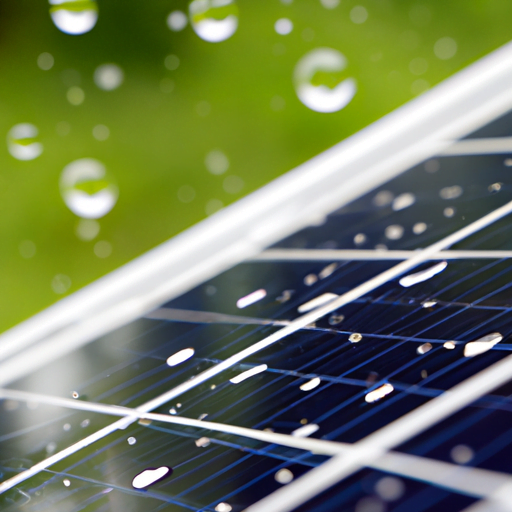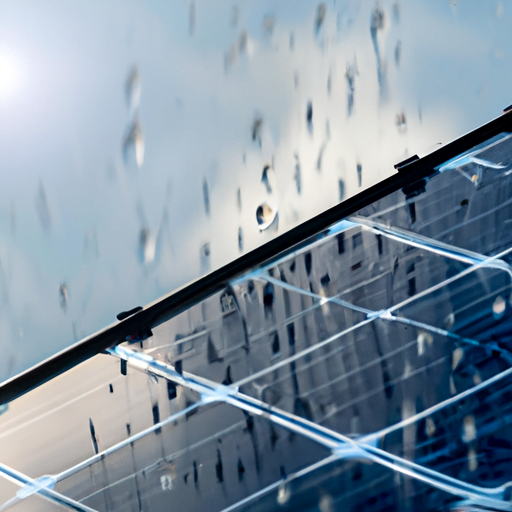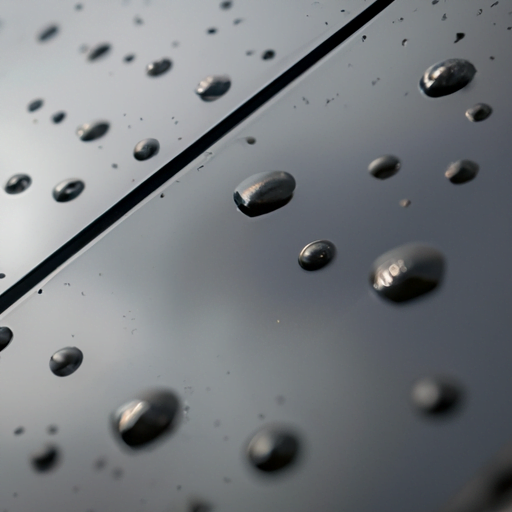Oh, have you ever wondered if solar panels can generate power in the rain? It’s an interesting question, isn’t it? I mean, we all know that solar panels rely on sunlight to generate electricity, but what happens when it’s rainy and cloudy outside? Do they just stop working? Well, let me tell you, there’s actually more to it than meets the eye.
So, here’s the deal. Solar panels do need sunlight to produce electricity, that’s a fact. But that doesn’t mean they can’t generate any power at all on a rainy day. You see, even on cloudy or rainy days, there is still some amount of sunlight that the panels can absorb and convert into electricity. It may not be as much as on a sunny day, but it’s still something. Plus, technology has come a long way, and there are now more advanced solar panels available that are specifically designed to be more efficient in low-light conditions.
Now, don’t get too excited just yet. While solar panels can generate some power in the rain, it’s not going to be as much as on a clear sunny day. So, if you’re relying solely on solar energy and you live in a region with a lot of rainfall, you might want to have a backup power source, just in case. But hey, every little bit counts, right? And with the continuous advancements in solar technology, who knows what the future holds? Maybe one day we’ll have solar panels that can generate power even in the heaviest of downpours.

Living off grid
Living off the grid refers to the practice of having a self-sustaining lifestyle without reliance on public utilities such as electricity, water, and gas. This way of living allows individuals or communities to be self-sufficient and independent, relying on their own resources rather than being connected to the traditional power grid.
Explaining off-grid living
Off-grid living involves being completely disconnected from the electrical grid and relying on alternative energy sources such as solar power, wind turbines, hydroelectric systems, or biomass to generate electricity. It also often involves implementing sustainable practices, such as water conservation, recycling, and growing one’s own food.
Advantages of living off the grid
There are several advantages to living off the grid. First and foremost, it provides energy independence and self-sufficiency. By relying on renewable energy sources, off-grid dwellers are not subject to power outages or fluctuations in utility prices. They have greater control over their energy consumption and can live a more sustainable and environmentally friendly lifestyle.
Living off the grid also leads to reduced utility bills. Instead of paying expensive monthly bills to public utilities, off-grid residents can enjoy the financial benefits of generating their own power and water. This can lead to significant savings in the long run.
Challenges and considerations
While off-grid living has its benefits, it also comes with its own set of challenges and considerations. One of the initial challenges is the setup and installation costs. Transitioning to an off-grid lifestyle often requires an upfront investment in renewable energy systems, water collection systems, and other infrastructure. However, these costs can be offset by long-term savings on utility bills.
Maintenance and upkeep requirements are another consideration. Solar panels, for example, require regular cleaning and inspection to ensure top performance. Similarly, batteries used for energy storage need periodic maintenance and replacement. Off-grid dwellers must be prepared to invest time and effort into maintaining their off-grid systems.
Another challenge is the limited energy storage capacity. Renewable energy sources like solar and wind power are intermittent, meaning they rely on the availability of sunlight or wind. During periods of inclement weather or low sunlight, it can be challenging to generate and store enough energy to meet the household’s needs. Mitigating this challenge often involves installing larger energy storage systems or using additional renewable energy sources like wind turbines or hydroelectric systems.
Lastly, adapting to variable weather conditions is crucial for off-grid living. This is especially true when considering the impact of rain on solar panels.
Renewable energy solutions for off-grid living
To sustain an off-grid lifestyle, various renewable energy solutions can be employed. One of the most popular and accessible options is solar power systems. These systems use photovoltaic panels to convert sunlight into electricity. Solar power is abundant and reliable, especially in sunny regions.
Wind turbines are another renewable energy solution for off-grid living. These turbines convert wind energy into electricity, making them a suitable option for areas with consistent wind patterns.
Hydroelectric systems utilize the energy from flowing or falling water to generate electricity. These systems can be installed in rivers, streams, or even small waterfalls, making them an attractive option for off-grid dwellers living near a water source.
Another renewable solution is biomass energy, which involves using organic material such as wood or agricultural waste to produce heat or electricity. This method is often employed in conjunction with other renewable energy systems, providing additional energy during times of low solar or wind resources.
Can Solar Panels Generate Power in Rain?
Understanding how solar panels work
Before discussing the effect of rain on solar panels, it is essential to understand how solar panels work. Solar panels utilize the photovoltaic effect, which is the conversion of sunlight into electricity. The panels are made up of multiple solar cells, typically composed of silicon, that absorb sunlight.
When sunlight hits the solar cells, the photons in the light excite electrons in the silicon, creating an electric current. This current is then converted into usable electricity using inverters and charge controllers.
Effect of rain on solar panels
While rain does affect the amount of sunlight reaching the solar panels, it does not mean that solar panels stop generating electricity altogether. Rain can reduce the amount of sunlight available, which in turn decreases the overall energy production of the solar panels. However, solar panels are designed to continue functioning and producing electricity even in cloudy or rainy conditions.
Factors affecting solar panel performance in rain
Several factors impact the performance of solar panels during rain. The angle and orientation of the panels play a significant role. Solar panels are usually installed at an angle to maximize the absorption of sunlight. Adjusting the angle of the solar panels can help optimize energy production during rainy weather.
The quality and cleanliness of the solar panels also affect performance. Dust, dirt, and debris can accumulate on the surface of the panels, reducing their efficiency. Regular cleaning and maintenance can help mitigate this issue.
Rainwater accumulation and drainage can impact performance as well. If rainwater pools on the surface of the panels, it can reduce the amount of sunlight reaching the solar cells. Proper installation and equipment design should take into consideration efficient water drainage.
Efficiency of electrical connections is another factor to consider. Moisture can increase electrical resistance, leading to a decrease in overall power output. Ensuring sound electrical connections and sufficient insulation can help maintain optimal performance.
Innovative technologies to enhance solar panel efficiency in rain
To address the challenges of rain and further improve the performance of solar panels during rainy weather, several innovative technologies are being developed. One such technology is hydrophobic coatings, which make the surface of solar panels water-repellent. These coatings prevent rainwater from accumulating and increasing the efficiency of the panels.
Another technology being explored is the use of self-cleaning solar panels. These panels have a special coating that helps remove dust and dirt when rainwater comes into contact with the surface. By reducing the build-up of debris, the panels can maintain their maximum performance even during rainy weather.
Additionally, some researchers are working on transparent solar panels that can generate electricity from raindrops themselves. These panels use a material called graphene that allows them to harness the energy from raindrops, providing an additional source of power during rainy weather.
In conclusion, solar panels can still generate power in the rain, although their efficiency may be reduced. Advancements in technology are continuously being made to improve the performance of solar panels during rainy weather. However, it is important to explore other renewable energy options as well to enhance the overall off-grid living experience.





